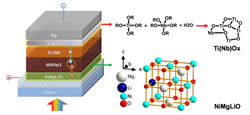Thin film perovskite solar cell passes the efficiency test
 Matthew Gunther for Chemistry World: Perovskite solar cells may one day rival silicon-based technologies, but their performance outside the laboratory has been a constant source of contention in the past year. Now, an international team of scientists has manufactured the first thin film perovskite solar cell with a reported efficiency that has beenofficially recognised by an accredited national test laboratory.1
Matthew Gunther for Chemistry World: Perovskite solar cells may one day rival silicon-based technologies, but their performance outside the laboratory has been a constant source of contention in the past year. Now, an international team of scientists has manufactured the first thin film perovskite solar cell with a reported efficiency that has beenofficially recognised by an accredited national test laboratory.1
Since their development in 2012, the performance of light-harvesting metal–organo halide structures has seemingly improved at a staggering rate, with their efficiency increasing by six percentage points in just two years – the same increase took multi-crystalline solar cells over two decades.
But their stability has been brought into question, with some international test centres taking issue with perovskite solar cells that are so unstable that they may degrade spontaneously in air, making it hard for them to assess their performance.
It’s a state of affairs that Michael Grätzel from the Ecole Polytechnique Fédérale de Lausanne in Switzerland has had trouble dealing with. ‘Conspicuously, you could see that from the very beginning there was very scarce information on the stability of these devices,’ comments Grätzel. ‘I have raised that issue many times – one would think that now everybody does stability work after this alarm was sounded, but not so.' Cont'd...
Comments (0)
This post does not have any comments. Be the first to leave a comment below.
Featured Product

